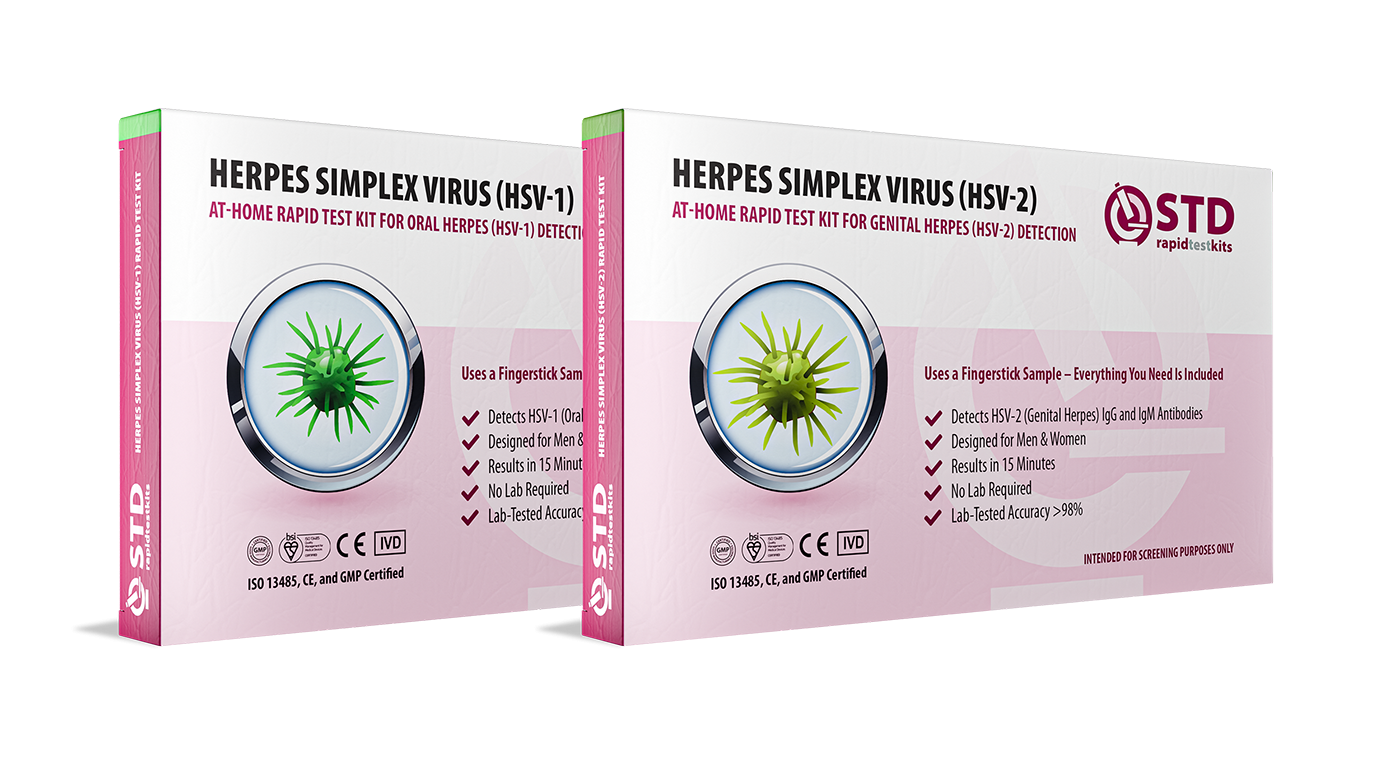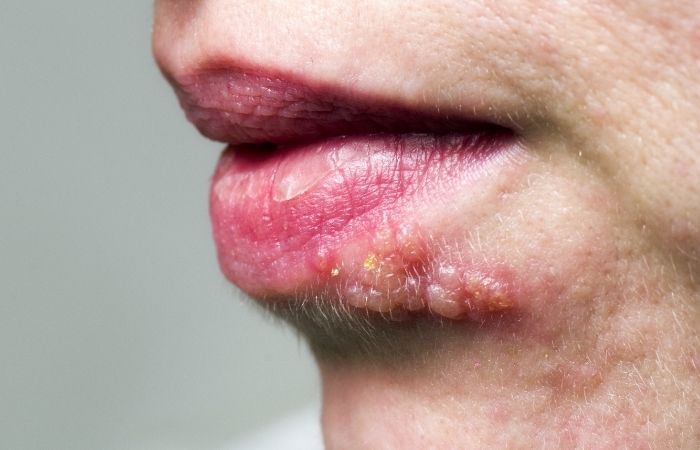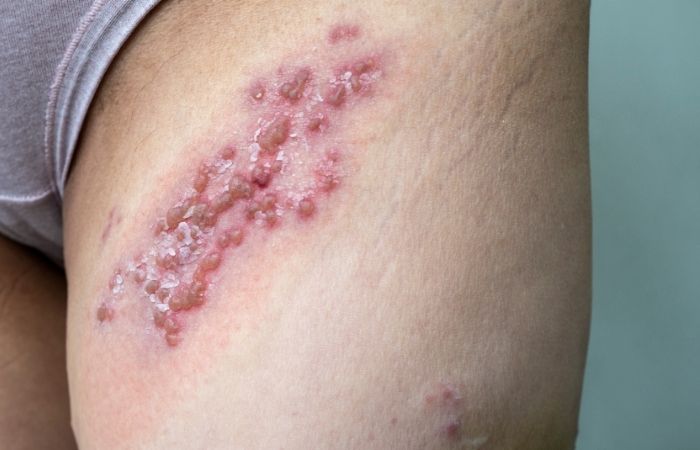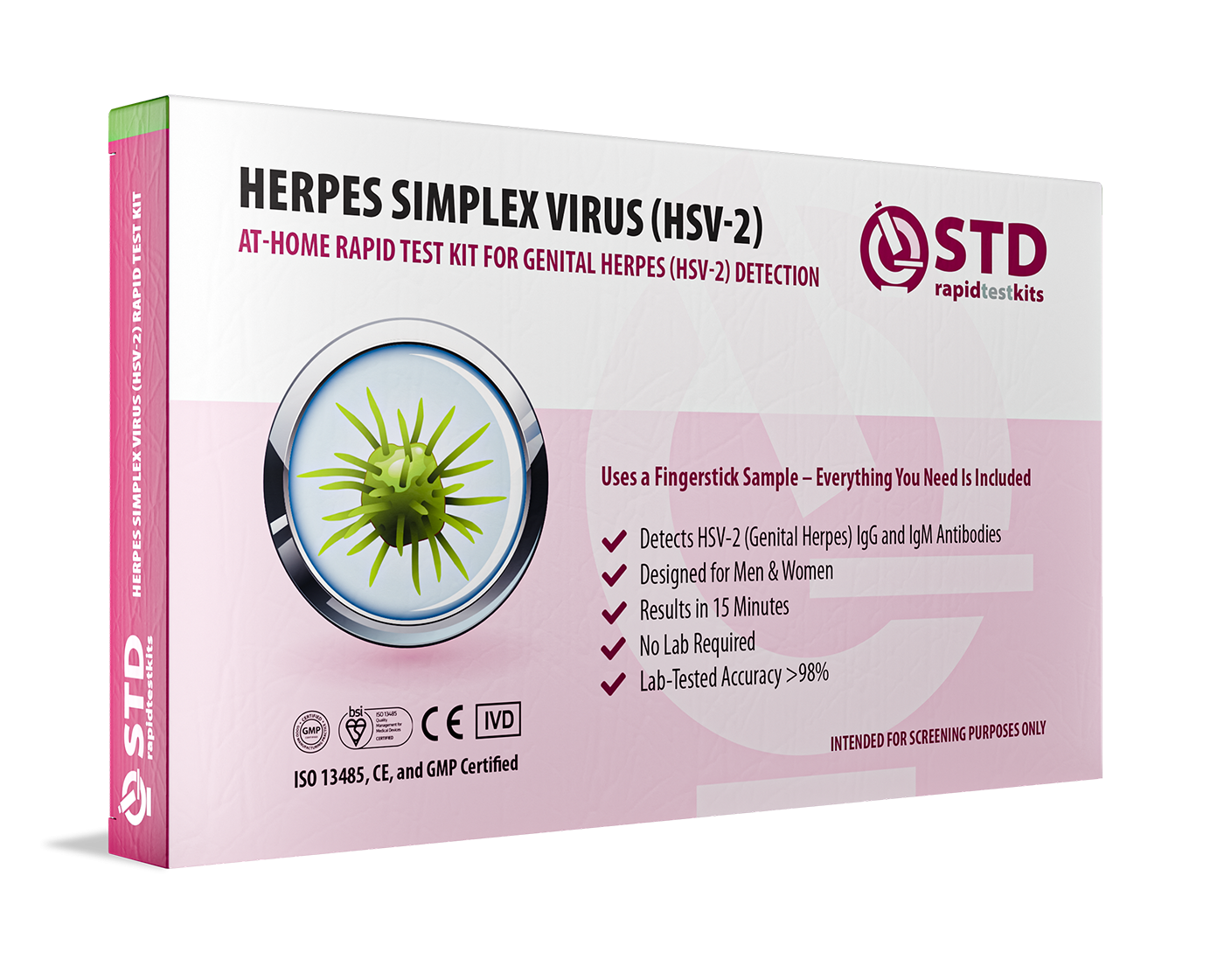Quick Answer: While herpes simplex virus type 2 (HSV‑2) is most commonly associated with genital infections, it can infect the mouth and throat through oral-genital contact. Though less frequent than HSV‑1 oral infections, oral HSV‑2 is medically possible, and often misunderstood. Knowing the risks, symptoms, and testing options is critical for safer sex and informed disclosure.
What Is HSV‑2 and How Is It Usually Spread?
Herpes simplex virus type 2 (HSV‑2) is one of two strains of herpes virus that cause oral and genital sores. While HSV‑2 is typically found in the genital area, it spreads via skin-to-skin contact, and that includes the mouth.
The most common transmission routes include:
- Genital-to-genital contact during vaginal or anal sex
- Oral-genital contact (e.g., giving oral sex to a partner with genital HSV‑2)
- Skin-to-skin rubbing near the genitals without penetration
Here’s the catch: HSV‑2 can spread even without visible sores. This is called “asymptomatic viral shedding,” and it’s one of the main reasons herpes continues to spread silently. Oral exposure doesn’t mean automatic transmission, but the risk is there.

People are also reading: Living with Herpes: Learning to Date Again
How Common Is Oral HSV‑2?
Oral HSV‑2 infections are less common than HSV‑1 oral infections, but they’re not medically rare. Because HSV‑2 prefers genital tissue, it doesn’t infect the mouth as easily as HSV‑1 does. Still, it can establish infection if enough virus is present, especially if the oral mucosa is irritated (from flossing, dental work, etc.).
In fact, studies show that around 1–2% of all HSV‑2 infections occur orally. That may sound small, but for the people living with oral HSV‑2, the impact is real. Many experience sore throats, painful lesions, and difficulty swallowing, especially during initial outbreaks.
Sadly, oral HSV‑2 often goes misdiagnosed as strep throat, tonsillitis, or even canker sores. Without accurate diagnosis, patients may spread it unknowingly.
Can You Get HSV‑2 in Your Throat?
Yes. HSV‑2 can infect the oral cavity and extend to the throat, particularly after giving unprotected oral sex to a partner with active genital herpes or during asymptomatic shedding. While not common, HSV‑2 in the throat can be extremely painful.
Symptoms of oral HSV‑2 may include:
- Sore throat or burning sensation when swallowing
- Clusters of painful ulcers or blisters inside the mouth or on lips
- Swollen lymph nodes under the jaw
- Fever, chills, body aches during first outbreak
Because herpes lesions can appear inside the throat, you may not see them in the mirror. A medical provider may need to perform a throat swab or viral culture to confirm diagnosis. Many patients are misdiagnosed with bacterial tonsillitis and are given antibiotics that don’t help.
If your sore throat doesn’t respond to antibiotics, and you’ve had recent oral-genital contact, HSV‑2 should be considered.
How Long Does Oral HSV‑2 Last?
Just like genital herpes, oral HSV‑2 comes with two phases: the initial outbreak and potential recurrences. The first outbreak is usually the worst, more painful, longer-lasting, and accompanied by systemic symptoms like fever and fatigue.
Typical timeline:
- Initial outbreak: 2–4 weeks
- Subsequent outbreaks: 3–7 days
- Latency: Virus hides in nerve endings, may reactivate later
The good news? Oral HSV‑2 recurs far less often than genital HSV‑2. Many people never have another outbreak after the first. That’s because HSV‑2 doesn’t prefer the oral environment, so while it can infect, it’s less likely to stick around or flare up repeatedly.
That said, if you do experience outbreaks, antiviral medications like valacyclovir or acyclovir can reduce their severity and frequency.
Check Your STD Status in Minutes
Test at Home with RemediumGenital & Oral Herpes Test Kit

 For Men & Women
For Men & Women Results in Minutes
Results in Minutes No Lab Needed
No Lab Needed Private & Discreet
Private & DiscreetOrder Now $75.00 $98.00
For all 2 tests
How to Test for Oral HSV‑2
Most people don’t realize you can get tested for herpes in the mouth, but you can. The catch is timing and test type.
Here are your options:
- Viral culture: Best used on an open sore during an active outbreak
- PCR test (DNA testing): More sensitive, can detect HSV even in early stages
- Blood test (IgG antibodies): Detects exposure over time, but doesn’t reveal location (oral vs. genital)
If you think you have oral HSV‑2, ask a provider to swab the sore (if present) and specify HSV‑2 testing. Don’t let them dismiss you with “It’s probably just a cold sore.” Demand precise diagnostics, because the treatment plan can differ based on virus type.
You can also use STD Rapid Test Kits to screen for herpes discreetly from home, using a small blood sample for IgG detection. This can help identify whether you’ve ever been exposed to HSV‑2, even without visible symptoms.
Is It Possible to Pass HSV‑2 Orally to Someone Else?
Yes. If you have oral HSV‑2, you can transmit it to a partner’s genitals through oral sex. Though oral HSV‑2 sheds less frequently than genital HSV‑2, transmission is still possible, especially during an outbreak or if you aren’t on antiviral medication.
To reduce risk:
- Avoid giving oral sex during an outbreak or if you feel tingling
- Use dental dams or condoms for oral-genital contact
- Take daily suppressive therapy to reduce asymptomatic shedding
Even kissing can pose a risk if blisters are present around the lips. Communication, informed consent, and shared decisions about protection are key.
How to Prevent Oral HSV‑2
The best protection against oral HSV‑2 is barrier use and communication. Unfortunately, many people don’t realize HSV‑2 can spread through oral sex, or they assume their partners are “clean” because they’re asymptomatic.
Here’s how to lower your risk:
- Use condoms and dental dams during oral sex, especially with new or untested partners
- Ask about STD testing history, many people haven’t been tested for herpes specifically
- Know the signs of genital outbreaks in partners (tingling, sores, unusual discomfort)
- Limit oral contact during genital flare-ups or when symptoms are uncertain
And remember, at-home herpes tests are a powerful tool for you and your partners. Testing isn’t awkward. It’s empowering.

People are also reading: STD Red Flags: When That Itch, Bump, or Burn Means Something Serious
Oral HSV‑2 vs. Oral HSV‑1: What’s the Difference?
Most people with “cold sores” have HSV‑1, the strain historically associated with oral infections. But when HSV‑2 appears in the mouth, it can confuse both patients and providers.
Here’s how they differ:
| Factor | HSV‑1 (Oral) | HSV‑2 (Oral) |
|---|---|---|
| Prevalence | Very common | Rare |
| Initial outbreak | Mild to moderate | Often more severe |
| Recurrence | Common | Rare |
| Transmission risk | High during outbreaks | Low but present |
In short, oral HSV‑1 is more likely to recur, but oral HSV‑2 may hit harder the first time. Both can be managed with antivirals. The stigma difference, however, is stark, mostly because people associate HSV‑2 with sexual behavior.
But your virus type does not define your worth. Your choices, your care, and your safety do.
The Role of Shame in HSV‑2 Awareness
If oral HSV‑2 is real, and medically documented, why do so few people know about it?
The answer lies in stigma. We’ve built a sexual hierarchy around cleanliness, risk, and morality. HSV‑2 often gets labeled as “the bad kind” because it’s typically sexually transmitted, and society still punishes people for having sex at all, especially if they’re young, queer, or marginalized.
This stigma affects everything:
- People don’t get tested
- Doctors don’t explain risks accurately
- Partners lie or avoid disclosure
- Herpes myths spread faster than the virus itself
Breaking that cycle means talking about all forms of herpes, including the ones people think are impossible. You’re not dirty. You’re not irresponsible. You’re human. And herpes is just a virus. Not a moral failure.
Oral HSV‑2 and Queer Sexual Health
The LGBTQ+ community faces higher rates of many STDs, including herpes, but often lacks inclusive, affirming care. Oral HSV‑2 is particularly relevant for queer people engaged in oral sex with partners who have genital herpes.
For example:
- Lesbian and bisexual women may perform oral sex without realizing HSV‑2 can be present without symptoms
- Gay and bi men engaging in rimming or oral sex may be at risk during genital outbreaks
- Trans and nonbinary folks often encounter dismissive or misgendering providers when asking about oral risk
Sexual health education needs to move beyond heterosexual, penis-in-vagina norms. Every body and every behavior deserves accurate, non-shaming information. Herpes doesn’t discriminate, so why should the care system?
Check Your STD Status in Minutes
Test at Home with RemediumOral Herpes Test Kit

 For Men & Women
For Men & Women Results in Minutes
Results in Minutes No Lab Needed
No Lab Needed Private & Discreet
Private & DiscreetOrder Now $33.99 $49.00
Why You Might Not Know You Have It
Oral HSV‑2 is easy to miss. The symptoms are often mistaken for common illnesses, and testing isn’t always done unless a sore is visible.
Common misdiagnoses include:
- Strep throat
- Canker sores
- Allergic reactions or food sensitivities
- Seasonal colds with mouth ulcers
What this means is that many people carry HSV‑2in their mouth and don’t know it. That’s why proactive testing matters, especially if you’ve had unprotected oral sex, throat pain that won’t go away, or a partner with genital herpes.
If your provider shrugs off your concerns? Get a second opinion. You deserve answers.
What Happens If You Get HSV‑2 on Both the Mouth and Genitals?
It’s rare, but not impossible, to have HSV‑2 infections in both the mouth and the genitals. This can happen if you acquire the virus at two separate times from two different types of exposure, or if autoinoculation (self-transfer from one area to another) occurs during a first outbreak.
If this happens:
- Outbreaks may occur in either region, though typically one becomes the dominant site
- You may need to be especially vigilant with hygiene during outbreaks
- Daily suppressive therapy becomes especially important to reduce shedding from multiple sites
While dual-location infection isn’t common, it emphasizes the importance of understanding herpes transmission beyond the binary. Barrier protection and informed testing matter regardless of where the symptoms appear.
Why Doctors Often Miss Oral HSV‑2
Many healthcare providers are not trained to think of HSV‑2 as an oral virus. Unless you’re dealing with a sexual health specialist or infectious disease doctor, the average clinician may dismiss the possibility, even when symptoms suggest otherwise.
Reasons it gets missed include:
- Prevalent belief that HSV‑2 is only genital
- Lack of standard testing protocols for throat herpes
- Assumptions based on outdated sex ed models
- Discomfort discussing oral sex and STDs
If you suspect oral HSV‑2 and aren’t being taken seriously, insist on a PCR swab or ask to be referred to a specialist. You have the right to informed, nonjudgmental care, and persistence can be life-changing.

People are also reading: Oral Trichomoniasis Exists, But Most People Miss the Signs
Living with Oral HSV‑2: Coping, Dating, and Disclosure
Living with oral HSV‑2 comes with its own emotional terrain, especially when you’re trying to explain something most people don’t even know exists.
Here’s what helps many people thrive after diagnosis:
- Joining a support group: In-person or online herpes communities offer judgment-free spaces
- Using scripts for disclosure: Practice makes it easier. The right partner will care more about honesty than the virus
- Learning the science: Understanding viral shedding, suppression, and actual risks keeps fear in check
- Redefining intimacy: Touch, communication, and closeness don’t require penetration to be real or satisfying
You are not broken. You are just navigating something misunderstood. And every time you talk about it, you make it easier for the next person.
Final Words: It’s Time to Start Believing Patients
Oral HSV‑2 shouldn’t be dismissed, debated, or denied. It should be understood. Diagnosed. Treated. And most of all, believed.
Too many people have been gaslit by professionals, shamed by partners, or left to Google symptoms alone because no one thought to test. We deserve better. And it starts with telling the truth, even if it’s uncomfortable.
Oral HSV‑2 is real. And so are the people living with it. If we want to reduce transmission, reduce stigma, and reduce suffering, we need to meet that reality with facts, compassion, and tools for safer sex.
STD Rapid Test Kits makes it easier to take that first step. Confidential, accurate, and no clinic required.
Talking About Oral HSV‑2 with Partners
If you’ve tested positive for oral HSV‑2, disclosure might feel terrifying. Most people still assume HSV‑2 only affects genitals. Explaining oral HSV‑2 requires patience, knowledge, and compassion, for them and for yourself.
Some tips for disclosure:
- Start with facts: “HSV‑2 usually affects the genitals, but I have it orally. It’s rare, but possible. I want to be honest with you.”
- Be clear about risk: “I’m not having symptoms now. I’m on meds. We can use barriers to make it safer.”
- Invite questions: “You don’t have to decide anything right away. I’m happy to talk through it or share more info.”
Honest communication doesn’t scare the right people away. It helps them show up better.
Check Your STD Status in Minutes
Test at Home with RemediumGenital Herpes Test Kit

 For Men & Women
For Men & Women Results in Minutes
Results in Minutes No Lab Needed
No Lab Needed Private & Discreet
Private & DiscreetOrder Now $45.99 $49.00
FAQs
1. Can you get HSV‑2 in the mouth?
Yes, though rare, HSV‑2 can infect the oral area, especially after performing oral sex on a partner with genital HSV‑2.
2. What are the symptoms of oral HSV‑2?
Painful throat ulcers, swollen glands, fever, and burning while swallowing. Some people have no symptoms at all.
3. Can oral HSV‑2 be cured?
No cure exists, but antiviral meds help reduce outbreaks, symptoms, and transmission risk.
4. Is oral HSV‑2 more serious than oral HSV‑1?
Not necessarily. Oral HSV‑2 often causes a more severe first outbreak but recurs less often than HSV‑1.
5. How do I know if it’s oral HSV‑2?
You need a PCR swab test of a lesion or an IgG blood test for HSV‑2 antibodies. Ask your doctor specifically.
6. Can I pass HSV‑2 from my mouth to a partner’s genitals?
Yes. If you have oral HSV‑2, you can transmit it through oral sex, especially during active shedding.
7. Does HSV‑2 live permanently in the mouth?
It can establish latency in the nerves serving the mouth, but it’s less likely to reactivate than in genital locations.
8. Is it safe to kiss with oral HSV‑2?
During outbreaks, no. During symptom-free periods, the risk is lower, but still present. Suppressive therapy helps.
9. Can I still get tested if I have no symptoms?
Yes. Blood tests can detect HSV‑2 antibodies even without visible sores. At-home test kits make this easier and private.
10. Should I avoid oral sex if I’ve had HSV‑2 in the mouth?
Not necessarily. Use barriers, communicate clearly, and consider suppressive meds. Safe sex is still possible.
The Truth About Oral HSV‑2 is Bigger Than Fear
Oral HSV‑2 may not be common, but it’s real. And for those living with it, understanding the risks, realities, and options can be liberating.
You don’t need to be afraid of your body. You need facts. You need access. You need a care system that believes you and educates you without shame.
Whether you’re navigating symptoms, dating with HSV‑2, or just learning how to protect yourself, STD Rapid Test Kits is here with reliable, private testing you can trust, without judgment, without stigma, and without delay.
Knowing is power. And you deserve to know.
Sources
1. CDC: Genital Herpes – Fact Sheet










